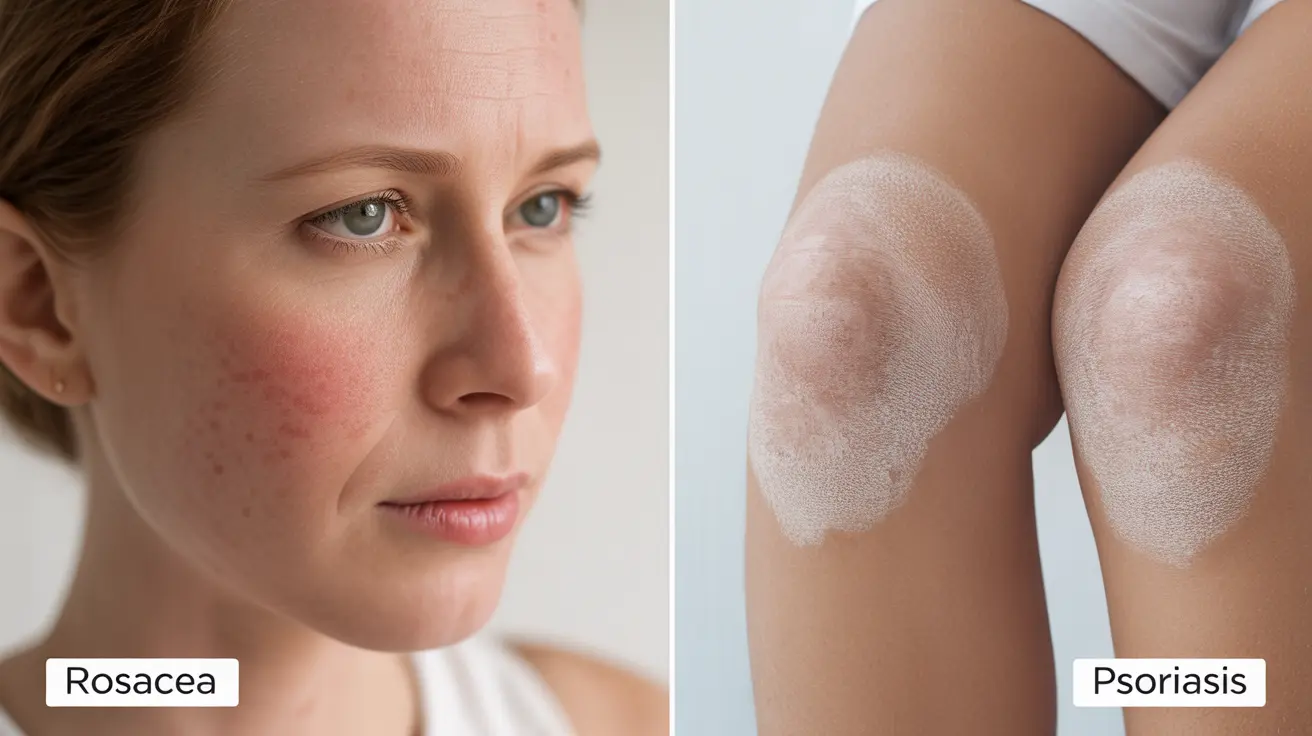When dealing with red, inflamed skin conditions, distinguishing between rosacea and psoriasis can be challenging. While both conditions can cause skin discomfort and affect your confidence, they have distinct characteristics, triggers, and treatment approaches. Understanding these differences is crucial for proper diagnosis and management.
This comprehensive guide will help you understand the key differences between rosacea and psoriasis, their unique symptoms, triggers, and effective treatment strategies for each condition.
Key Characteristics and Appearance
Rosacea primarily affects the face, particularly the cheeks, nose, chin, and forehead. It typically appears as persistent redness, visible blood vessels, and sometimes small, red bumps. The skin may feel sensitive and look flushed, similar to blushing.
Psoriasis, on the other hand, can appear anywhere on the body and manifests as thick, red patches covered with silvery-white scales. These patches, known as plaques, have clearly defined borders and can be itchy or painful. While psoriasis commonly affects the elbows, knees, and scalp, it can also appear on the face.
Distinct Symptoms and Features
Rosacea Symptoms
- Facial redness and flushing
- Visible blood vessels (telangiectasia)
- Sensitive, burning skin
- Small red bumps or pustules
- Eye irritation in some cases
- Thickening of nose skin (rhinophyma) in severe cases
Psoriasis Symptoms
- Thick, scaly plaques
- Silvery-white scale buildup
- Dry, cracked skin that may bleed
- Itching and burning
- Nail changes (pitting, ridges)
- Joint pain (in psoriatic arthritis)
Understanding Triggers
Rosacea flare-ups are often triggered by environmental and lifestyle factors such as sun exposure, hot weather, spicy foods, alcohol, stress, and certain skincare products. The condition tends to worsen with these triggers and improve when they're avoided.
Psoriasis triggers typically include stress, skin injuries, certain medications, infections, and cold weather. The condition is an autoimmune response, causing rapid skin cell turnover and inflammation. Unlike rosacea, psoriasis triggers are often more systemic than environmental.
Treatment Approaches
Rosacea Management
Treatment for rosacea focuses on controlling symptoms and preventing flare-ups through:
- Topical medications (metronidazole, azelaic acid)
- Oral antibiotics for severe cases
- Laser therapy for visible blood vessels
- Gentle skincare routine
- Trigger avoidance
- Sun protection
Psoriasis Management
Psoriasis treatment typically involves:
- Topical corticosteroids
- Vitamin D analogues
- Systemic medications for severe cases
- Biologics for moderate to severe psoriasis
- Phototherapy (UV light treatment)
- Moisturizing regularly
Frequently Asked Questions
What are the main differences between rosacea and psoriasis in symptoms and appearance?
Rosacea appears as facial redness with visible blood vessels and possible bumps, while psoriasis shows as thick, red patches with silvery scales that can appear anywhere on the body. Rosacea is limited to the face, while psoriasis can affect any skin area.
How can I tell if my red facial rash is rosacea or psoriasis?
Rosacea typically causes facial redness and flushing without scaling, while facial psoriasis will show thick, scaly patches with clear borders. Rosacea also tends to be more sensitive and reactive to environmental triggers.
What triggers flare-ups in rosacea compared to psoriasis?
Rosacea is typically triggered by external factors like sun, heat, spicy foods, and alcohol. Psoriasis flares are often triggered by internal factors such as stress, infections, and certain medications, along with skin injuries and cold weather.
What are the most effective treatments for managing rosacea versus psoriasis?
Rosacea is best managed with topical medications, trigger avoidance, and gentle skincare. Psoriasis often requires stronger treatments like corticosteroids, systemic medications, or biologics, depending on severity.
Can psoriasis affect the face and nails, and how is that different from rosacea?
Yes, psoriasis can affect both face and nails, causing scaling on the face and nail changes like pitting and ridging. Rosacea only affects the face and never causes nail changes. Facial psoriasis shows characteristic scaling, while rosacea causes redness without scales.




